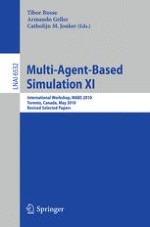This volume contains a selection of the papers presented at the 11th International Workshop on Multi-Agent-Based Simulation (MABS 2010), a workshop co-located with the 9th International Joint Conference on Autonomous Agents and Multiagent Systems (AAMAS 2010), which was held on May 10-14, 2010 in Toronto, Canada. The 11 revised full papers presented were carefully reviewed and selected from 26 submissions. The workshop has been an important source of inspiration for the body of knowledge that has been produced in the field of Multi-Agent Systems (MAS). As illustrated by this volume, the workshop continues to bring together researchers interested in MAS engineering with researchers focused on finding efficient ways to model complex social systems in social, economic and organizational areas. In all these areas, agent theories, metaphors, models, analyses, experimental designs, empirical studies, and methodological principles all converge into simulation as a way of achieving explanations and predictions, exploring and testing hypotheses, and producing better designs and systems.
